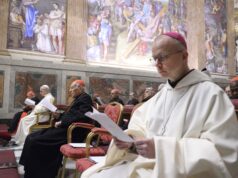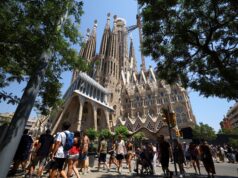
VATICAN CITY — At a time when so many people and the planet are suffering, the world’s religions need to come together to promote truth, compassion, reconciliation, justice and peace, Pope Leo XIV said.
“Today we are called upon to rekindle that hope in our world, devastated by war and our degraded natural environment,” the pope said Oct. 29 during his weekly general audience in St. Peter’s Square.
“Let us collaborate, because if we are united, everything is possible. Let us ensure that nothing divides us,” he said, addressing the many representatives of Christianity, Judaism, Islam, Hinduism, Jainism, Sikhism, Buddhism and other religions that were present at the audience.
Many of the leaders had been in Rome for a meeting of religions for peace sponsored by the Community of Sant’Egidio and a series of events, including a nighttime celebration Oct. 28, marking the 60th anniversary of “Nostra Aetate,” the Second Vatican Council’s declaration on relations with Judaism, Islam and other world religions.
In fact, Pope Leo set aside his ongoing series of audience talks on the Jubilee theme, “Jesus Christ our Hope,” to dedicate the Oct. 29 audience to “Nostra Aetate,” which was promulgated 60 years ago: Oct. 28, 1965.
The first focus of the landmark document “was toward the Jewish world,” the pope said. “For the first time in the history of the church, a doctrinal treatise on the Jewish roots of Christianity was to take shape, which on a biblical and theological level would represent a point of no return.”
While much has been achieved in Jewish-Catholic dialogue over the past six decades, he said, “we cannot deny that there have been misunderstandings, difficulties and conflicts in this period, but these have never prevented the dialogue from continuing.”
“Even today, we must not allow political circumstances and the injustices of some to divert us from friendship, especially since we have achieved so much so far,” he said.
Quoting “Nostra Aetate,” the Catholic Church, “mindful of the patrimony she shares with the Jews and moved not by political reasons but by the Gospel’s spiritual love, decries hatred, persecutions, displays of antisemitism, directed against Jews at any time and by anyone,” he said to applause.
“Since then, all my predecessors have condemned antisemitism with clear words,” Pope Leo said. “And so I too confirm that the church does not tolerate antisemitism and fights against it, on the basis of the Gospel itself,” which was also followed by applause.
“The spirit of ‘Nostra Aetate’ continues to illuminate the path of the church,” which recognizes that all religions can reflect “a ray of that Truth which enlightens all men,” he said, citing the document.
Today, more than ever, he said, all of the world’s religions need to act together. “Our world needs our unity, our friendship and our collaboration.”
“Each one of our religions can contribute to alleviating human suffering and taking care of our common home, our planet Earth,” he said. “Our respective traditions teach truth, compassion, reconciliation, justice and peace. We must reaffirm service to humanity at all times.”
In addition to remaining “vigilant against the abuse of the name of God, of religion and of dialogue itself, as well as against the dangers posed by religious fundamentalism and extremism,” he said, “we must also face the responsible development of artificial intelligence.”
If AI is intended to be “an alternative to humans, it can gravely violate their infinite dignity and neutralize their fundamental responsibilities,” the pope said. “Our traditions have an immense contribution to make to the humanization of technology and therefore to inspire its regulation, to protect fundamental human rights.”
“The declaration invites all Catholics — bishops, clergy, consecrated persons and lay faithful — to involve themselves sincerely in dialogue and in collaboration with the followers of other religions, recognizing and promoting all that is good, true and holy in their traditions,” Pope Leo said.
“‘Nostra Aetate’ reminds us that true dialogue is rooted in love, the only foundation of peace, justice and reconciliation, whereas it firmly rejects every form of discrimination or persecution, affirming the equal dignity of every human being,” he said.
“We must restore hope to our personal lives, our families, our neighborhoods, our schools, our villages, our countries and our world,” he said. “This hope is based on our religious convictions, on the conviction that a new world is possible.”
Concluding his remarks, Pope Leo then led a moment of silent prayer since “prayer has the power to transform our attitudes, our thoughts, our words and our actions.”








